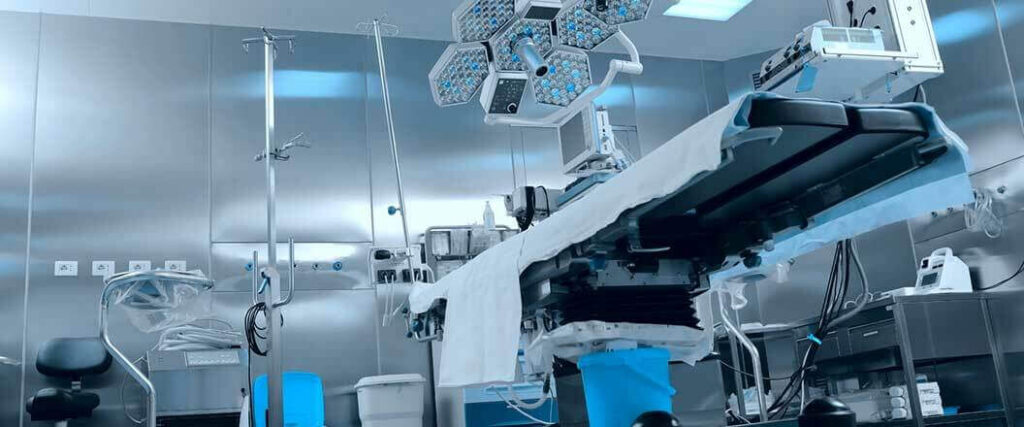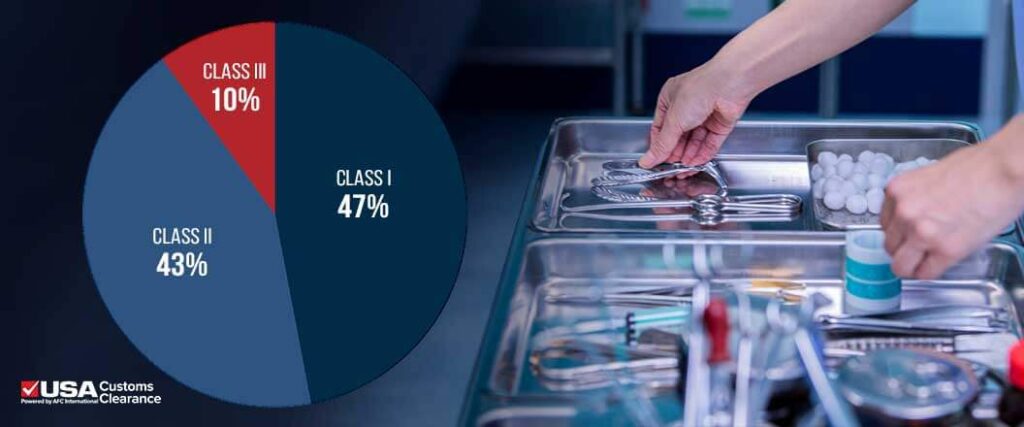
The importation of medical devices and personal protective equipment (PPE) into the U.S is strictly regulated by the U.S. Food and Drug Administration (FDA). In order to avoid seizure of these products by U.S. Customs and Border Protection (CBP), it’s imperative that you adhere to the rules and regulations.
Medical instruments imported into the U.S. must gain FDA approval before being cleared by CBP. In order to demonstrate compliance with the applicable regulations, an importer must submit the following in order to verify compliance with FDA regulations:
The FDA's clearance process involves the review of the product's safety and effectiveness, labeling, and compliance with the agency's regulations and requirements. If these standards are not met, the FDA may gather additional information, or detain your product. Learn more about these requirements and how to ensure your shipment is compliant.
Before importing medical devices into the U.S., it’s advisable to consult with a Licensed Customs Broker.They can review the details of your shipment to ensure you’re in compliance. If your shipment is non-compliant, we’ll go over exactly what needs to be done in order to bring it into compliance and successfully enter the U.S.

The short answer is: No, you do not need an import license to import medical supplies or PPE to the U.S. But that doesn’t mean that there is no additional regulation you'll need to comply with.
Instead, importers may be required to register with the FDA. Some entities may also be required to list all of the devices and activities performed. The most important detail that determines your FDA registration and listing responsibilities is the type of activity that you conduct in regards to the medical instruments.
Some of the domestic establishments that are required to register with the FDA include:
In contrast, businesses like wholesale distributors, customs brokers, component manufacturers are not required to register with the FDA.
The FDA views foreign establishments as unique and has separate criteria to determine registration requirements.
Some of the foreign entities that must register with the FDA include:
Regardless, it’s worthwhile to verify whether or not you’re required to register with the FDA before importing medical equipment. Not being registered despite being required to do so can cause serious issues when it’s time to import.
In addition to registering with the FDA, you’ll also need to obtain a customs bond before importing. A customs bond is required for medical device imports because they’re regulated by the FDA.
Import bonds can be either a single entry bond or continuous. We offer continuous customs bonds which allow you to cover all of your shipments for one full year from the date that the bond is issued.

Worried About FDA Compliance? Ask Our Experts.
Our Licensed Customs Brokers Will Personally Guide You.
The FDA, under the U.S. Food, Drug, and Cosmetic Act (FD&C Act), demands that all medical instruments must comply with a strict set of regulations before being allowed entry into the country. This is to ensure safety and effectiveness.
This act finds its basis in the Code of Federal regulations (CFR), Title 21, Parts 800-1299, and foreign manufacturers must ensure that the devices they produce adhere to these regulations if they want to be able to market these products commercially.
Depending on the device, one of these premarket confirmations will be required. Both are designed to ensure that equipment meets specific FDA standards before entering the U.S. market. Proof of approval from the FDA will be required at the time of import.
As discussed previously, establishments engaged in these activities must undergo an annual registration process.
This registration serves as a crucial step in ensuring accountability and transparency within the industry. Alongside registration, establishments are obliged to provide comprehensive listings of the instruments they handle, and detail the associated activities conducted at their premises.
These requirements not only facilitate regulatory oversight, but also bolsters consumer confidence by fostering a culture of accountability and traceability.
All medical instruments coming into the U.S. are required to meet certain FDA labeling standards.
Labeling standards include:
Some devices such as condoms, hearing aids, and eyeglasses must meet additional labeling requirements. Many businesses are surprised to learn that sunglasses and glasses are subject to import regulations by the FDA.
Check out our article Importing Sunglasses and Glasses Into the U.S.
The FDA must have access to past reports of complaints regarding any medical instruments. Devices deemed to be unsafe will be denied entry.
For manufacturers, this means reporting to the FDA when they learn of any of their equipment having caused or contributed to a death or serious injury. They must also report when they become aware that their device has malfunctioned in such a way that would cause injury or death were it to malfunction again.
Importers must also report to the FDA when they learn of any of their devices having caused or contributed to a serious injury or death. However, if their device malfunctions, they must only report it to the manufacturer of the product.
Some medical instruments are also required to be physically tracked from manufacture through consumer use. This only applies to certain Class II and III medical devices.
Medical devices, as well as products like food and drugs, must adhere to stringent quality systems. These systems, known as current good manufacturing practices (CGMPs), serve as the cornerstone for maintaining product integrity and meeting regulatory standards.
Unlike prescriptive guidelines dictating specific manufacturing processes for each device, CGMP regulations offer a flexible framework. They require manufacturers to develop and implement procedures tailored to their specific products while adhering to industry best practices.
This approach acknowledges the diverse nature of medical equipment and allows manufacturers to incorporate the latest advancements in manufacturing technologies.
Manufacturers must show sound judgment when creating these guidelines. It falls upon each manufacturer to define requirements unique to their products, ensuring they are safe and efficacious. This involves establishing comprehensive methods and procedures encompassing all stages of the product life cycle, from design and production to distribution and beyond.
Notably, the FDA has recently issued the Quality Management System Regulation (QMSR) Final Rule as an amendment to the CGMP, incorporating the international standard specific for medical device quality management systems set by the International Organization for Standardization (ISO). This rule will remain in effect until Feb. 2, 2026.
It’s important to remember that these FDA requirements are in addition to standard CBP rules required when importing. With so many opportunities for things to go wrong, it’s best to partner with a reliable expert that can make sure everything is in order.
Our team of licensed professionals at USA Customs Clearance have worked closely with many importers of FDA regulated products. We’ve simplified the import process for our partners and can do the same for you.

The duties owed on imported medical supplies vary based on a number of different factors. First, there are countless different types of medical devices and each has their own unique HTS code. Many devices even have multiple codes depending on specific features of the product, such as component materials, size, and more.
Second, the country of origin where the finished product was manufactured is an important aspect. For example, a thermometer from China will have a different import duty than one imported from Mexico.
According to the Observatory of Economic Complexity (OEC), Mexico accounts for more than a quarter of medical instrument imports into the U.S.
| Country | Value of Exports |
| Mexico | $9.48 Billion |
| Germany | $3.37 Billion |
| Ireland | $3 Billion |
| Costa Rica | $2.93 Billion |
| China | $2.52 Billion |
Source: https://oec.world/en/profile/bilateral-product/medical-instruments/reporter/usa
Thankfully, the U.S. sees the value in high-quality imported medical instruments and in turn assesses a 0% import duty on many devices, imported from most countries. However, some products are still assessed an import duty, typically ranging from 2-6%.
In May 2024, the Biden Administration announced a new set of tariffs on select medical supplies imports from China.
Regardless of whether your device is subject to import duties or not, it will still need to be classified with the correct HTS code. Classifying your product with the wrong code will lead to additional inspections and possible fees from CBP.
During our customs consulting sessions, our brokers can provide you with the correct product code for your product. This ensures that your shipment will clear customs quicker and with less scrutiny.

Worried About FDA Compliance? Ask Our Experts.
Our Licensed Customs Brokers Will Personally Guide You.
The FDA classifies medical devices into three classes, each with their own increasing levels of regulation.
The classification of a device is based on a number of factors, including its intended use and its risk level to the patient or user. The class to which your product is consigned will impact the premarketing accommodation/application required for FDA leeway to advertise.
In total, the FDA has classified and described over 1,700 distinct types of devices. These have been organized into 16 medical specialty "panels" in the CFR. The FDA also has a search database that importers can use to identify their products and the exact classifications they fall into.
Class I devices are deemed to pose the lowest risk and are subject to “general controls” - regulatory requirements authorized by the FD&C Act that apply to all medical devices, unless otherwise exempt.
Medical supplies in this category are subject to the least regulatory control, and may be entered into the U.S. by simply ensuring that they conform to the above FDA guidelines. 47% of FDA regulated medical devices fall under this class.
Most PPE imported into the country falls into either this classification or Class II. Examples of class I equipment consist of:
Class II devices pose a “moderate to high” risk to their intended users, as a defective class II device may cause harm and injury to consumers if found faulty. 43% of FDA regulated medical equipment falls under this class.
This classification of medical supplies is subject to both general controls as well as special controls. Although some class II devices are excluded from the premarket announcement, special control may consist of:
Post-market surveillance (PMS) is described as a ‘system that provides continuous feedback about a medical instrument on the market to maintain a high standard of product quality.’ PMS is an administrative requirement in significant business sectors like Europe and the United States.
The surveillance system can be used to deny or verify the safety of devices and drugs after being used by a large population of people with various health conditions.
Some examples of class II medical devices include:
Class III devices carry the highest level of risk and fall under this classification when there is not adequate information to ensure the overall safety and effectiveness for them to be categorized under Class I or Class II. 10% of FDA regulated medical devices fall under this class.
Class III devices “support or sustain human life, are of substantial importance in preventing impairment of human health, or which present a potential, unreasonable risk of illness or injury.” Such devices require premarket validation, a rational way to guarantee the product’s wellbeing and efficacy.
Examples of Class III devices include the following, as they require premarket notification.

Some medical devices are listed as ‘exempt’ meaning they fall into a generic category of Class I devices. These items do not require a premarket notification application or FDA clearance before being marketed in the U.S.
However, the manufacturer of an exempt product must still register their establishment and list their generic product with the FDA.
Examples of exempt devices include the following:
Many medical devices are manufactured in and imported from China, resulting in a large number of these products being impacted by Section 301 tariffs. These tariffs impact thousands of products imported from China and can be as high as 25% in some cases.
However, some products have been granted a section 301 exclusion. Importers can apply for the exclusion, which will lift some or all of the additional section 301 duties owed on the product. These exclusions are evaluated on a case-by-case basis and consider factors such as:
While many of these exclusions have expired, the United States Trade Representative (USTR) has granted multiple extensions to a number of products, including many medical devices.
Before importing medical equipment from China, it’s wise to consult with our team. Due to the rocky trade relations, CBP has been applying extra scrutiny to imports from China. No need to worry though as our team has extensive experience. We’ve even recovered millions in section 301 duty drawbacks for our clients through various methods.

During the customs clearance process for medical devices, your import may go through various FDA customs holds. To better understand the different types of holds/exams, we can examine them in detail below.
The FDA is approved to inspect and gather tests of FDA-controlled items offered for import into the U.S. If the FDA chooses to inspect or test your products, a Notice of FDA Action will be given to the importer of record, consignee, and filer.
It is your obligation to advise the FDA office taking care of your arrival that your items are available for assessment. The FDA office taking care of your entry is recognized on the Notice of FDA Action.
When the area of your item is given, the FDA will proceed to analyze the items. Items pending FDA assessment or test assortment must be held and ought not to be dispersed into the business until results are assessed, and the items are delivered. The inability to store your items may bring about FDA ordering CBP to request redelivery.
On the off chance that the imported supplies appears to be in violation of any import requirements, the device will be temporarily detained. FDA will provide a notice of action along with specific details of the suspected violation.
The importer will then have a chance to offer evidence in opposition to the violation within a defined period.
An import alert is issued when there is enough proof or other information available for FDA personnel to allow for Detention Without Physical Examination (DWPE) of products focused on an import alert.
Items are liable to DWPE, dependent on past infringement. These infringements could be identified with the product, manufacturer, transporter as well as other data showing the item might be disregarding FDA laws.
FDA-regulated items can be denied admittance to the U.S. in the event that they don’t comply with the FDA’s laws and guidelines. The motive behind such could be the labels containing false information, unapproved new drugs, items restricted for sale in the U.S., and products that are contaminated and, therefore, unsafe for use.
In August 2020 alone, there were over 1,000 unique FDA regulated goods that were denied entry into the U.S.
These are regular assessments carried out on filer entries to ensure that they’re being submitted accurately. Filer evaluations can take place during or after an import takes place. Importers will only be notified if an entry is found to contain errors.
To learn more, check out our article on FDA Customs Holds.
As you can see, importing medical devices into the U.S. can be quite a challenge. Thankfully, you don’t have to tackle it alone. With our experienced and knowledgeable team, by your side, you’ll have the support you need.
We’ll provide you with critical information and assistance every step of the way. If you just need information to get the job done yourself, schedule a customs consulting session with one of our licensed customs brokers. They’ll answer all of your questions and provide you with everything you need.
Need more help? We’ve got you covered. Our complete range of customs clearance services enables us to handle the entire importing process for you. From ISF Filing to duty drawback and more, we can serve as your one-stop shop for all of your importing and transportation needs.
Give us a call at 855-912-0406 or complete an online contact form and get started today.

Worried About FDA Compliance? Ask Our Experts.
Our Licensed Customs Brokers Will Personally Guide You.
 Copy URL to Clipboard
Copy URL to Clipboard
I am trying to import Prototype Medical Equipment from China into the US.
Problem is certain products are flagging for FDA information based on the HTS # we used to classify. Not sure how to fix this other than changing the HTS # which we don't want to do. Any Suggestions ?
We are working on the importing and distributing colour contact lens from China to the US. Manufacturer is FDA approved in Taiwan. We are only distributing the products. I wonder what licence I need to selling in the US. Thanks!
What is needed for a medical device from China to be imported into the US, for the manufacturing process to be completed in the USA and for us to obtain the FDA approval for sales and distribution ?